International Pole and Line Foundation (IPNLF), together with renowned videographer Pepe Brix, proudly debuted the film “A TRULY PLASTIC NEUTRAL FISHERY” at the Pacific Whale Foundation’s 8th Annual World Whale Film Festival last night in Hawai’i.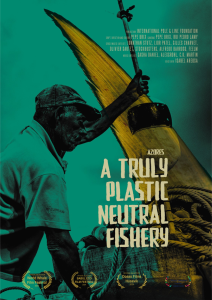
The film highlights the pressing concerns surrounding ocean plastic pollution and the large quantities of abandoned, lost, or discarded fishing gear (ALDFG) from industrial fisheries while underscoring the Azores pole-and-line fishery’s commitment to responsibility by becoming the world’s first “plastic-neutral” fishery.
Taking the World Stage
The short documentary aims to educate and inspire and has been selected to feature at multiple international film festivals this month in the USA, Iceland, Portugal, Italy, Spain, and India. The campaign intends to create a global movement to hold the large-scale fishing industry accountable for its massive contribution to ocean plastic pollution.
Charles Redfern, founder of Fish4Ever:
“In 2021, IPNLF, Biocoop France, and Fish4Ever joined forces with the Azores ocean sustainability management NGOs OMA, POPA, and IMAR of the University of the Azores to make the Azores the first evidence-based plastic-positive tuna fishery in the world to show that pole-and-line tuna fisheries do not contribute to ocean plastic pollution, but in fact, can offer a solution.“
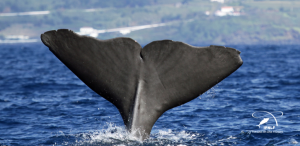
Recently named a Whale Heritage Site and a Hope Spot, the Azores demonstrates a commitment to ocean conservation that surpasses global standards. With over 110,000 km2 of existing marine protected areas, the local communities and conservation groups work tirelessly to safeguard their environment and the dependent marine organisms. With an exclusive pole-and-line fishing zone, the Azores artisanal fishery catches its seafood responsibly. However, the island’s geographical location, on the periphery of the North Atlantic subtropical gyre, exposes it to a heavy influx of marine plastic debris, predominantly fishing gear, primarily discarded or lost by foreign fisheries operating in other regions and carried by currents from different oceanic regions.
Marine plastic debris litter coastlines, entangles endangered and protected species, and has toxic, cumulative effects throughout the food chain. In doing so, it spreads diseases, contributes to invading alien species into different ecosystems, and regularly enters the waters of those who did not cause the pollution – such as the Azores.As in many instances, the communities that carry the burden of the impacts are rarely responsible for creating the issue.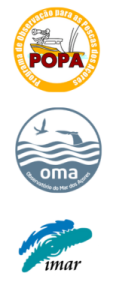
ALDFG encompasses a significant proportion of global ocean plastic pollution by weight, and lost fishing nets are considered the most harmful form of ocean plastic pollution. Synthetic nets remain in the ocean indefinitely until removed. In the Azores archipelago, these “ghost nets” entangle, suffocate and kill a wide range of marine megafauna with impacts throughout ecosystems.
To draw attention to this issue, IPNLF worked with local partners – the Sea Observatory of the Azores (OMA) and the Azores Fisheries Observer Program (POPA), managed by the Institute of Marine Research (IMAR) to quantify the annual weight of ALDFG produced by the Azores pole-and-line fishery in 2019. It was found that the entire fleet only loses 0.5kg of fishing gear-related litter annually. This amount is near to nothing compared to other gear types, such as longline, trawling, or purse seine methods, that use far more plastic (nets) in their operations.
However, all gears must be held to the same environmental standard.
The Plastic Neutrality Project, launched in collaboration with the Sea Observatory of the Azores (OMA), POPA, IMAR, Associação de Produtores de Atum e Similares dos Açores (APASA), FPA, and with funding from Fish4ever and Biocoop France, aimed to coordinate three annual Ghost Gear Removal Competitions from 2021 to 2023.
The competition among the pole-and-line fleet worked to remove ALDFG and marine debris they encountered during their fishing trips and, in doing so, achieved the world’s first plastic neural fishery. In the first year of the competition, fishers removed 875 times more plastic than they lost, and in the following year, the fleet removed 734kg of marine litter (620kg confirmed to be fishing gear), which is almost 1500 times more plastic than they lost in the same time frame. Therefore, in 2022, the Azores was already officially named the world’s first “plastic-neutral fishery”!
2023 was even more successful as the fleet had already matched the achievements of previous years, with two months left in the competition. Based on the organisms found, one of the large nets retrieved could be traced back to being lost or discarded over 30 years ago near Greenland! This means this incredibly large net had been ghost fishing throughout the Atlantic Ocean, ultimately ending up at the Azores archipelago. Imagine the damage it has done over the past three decades!
The competitions achieved their primary objective and elevated the fishery to a plastic-positive status for the next 800 years.
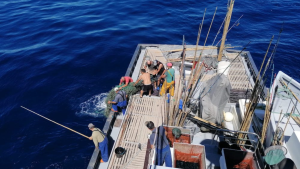
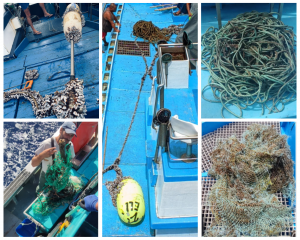
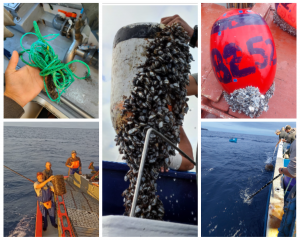
While consumers may not bear direct responsibility for abandoned gear at sea, their purchasing choices influence demand and, consequently, the market. Seafood, particularly tuna, harvested using diverse methods worldwide, has varying consequences for oceans and the environment.
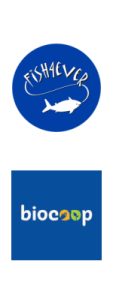
Charles Redfern, founder of Fish4Ever, urges consumers to demand traceability information on products available on all Fish4Ever tuna cans. “Traceability ensures transparency across the supply chain, granting all stakeholders, including consumers, access to information about the products they purchase”.
Franck Bardet, Responsible filière Biocoop France, emphasises the importance of consumers’ responsibility to make an effort to understand where their food comes from and how it was sourced/produced; “Each consumer today plays a more significant role in shaping what will be possible in the future.”
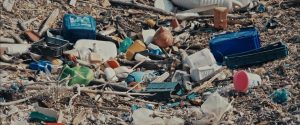
However, the consumer can only do so much, and it’s unfair to attribute the responsibility solely to the end buyer. Decision-makers need the power to choose responsibly and enforce change. In this case, it would come down to the procurement decisions of brands and retailers honouring their commitment to responsible and sustainable sourcing. They would need to look beyond stickers, stamps, and claims and truly consider the impact of fishing gear on the species they stock.
Legislative decision-making must ensure that contributions to ocean conservation are duly acknowledged in markets and regulations. This recognition allows fisheries to employ sustainable and responsible practices, particularly those utilising the most selective fishing methods and attempting to reduce their overall environmental impact, to derive social and economic benefits from their work and thereby secure their livelihoods. Furthermore, they must start holding the industry that uses these large nets and is not taking responsible control of their loss or discard more accountable for their actions.
It is an incredible achievement to be the world’s first plastic-neutral fishery. This initiative by the one-by-one Azores fisheries, which do not significantly contribute to oceanic plastic pollution, sets a benchmark for best practices in the industry. Fisheries contributing to pollution must adhere to this standard, fostering collective action to combat plastic pollution at sea. The innovative plastic removal approach holds potential for broader industry adoption, catalysing positive global changes.
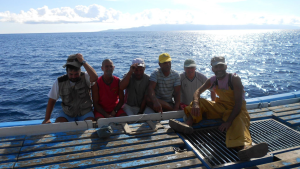
The Azores fishery employs traditional pole-and-line techniques – the two main gears being a bamboo pole with a barbless hook attached at the end of a line and a thin, hard, wooden pole with a barbless hook and line, used during tuna frenzies where rapid fishing takes place. This fishing method is one of the most sustainable due to its low environmental impact, selective targeting of species, and minimal bycatch, ensuring the long-term health of marine ecosystems. Once caught, the tuna is brought ashore and processed in one of the local canneries in the Azores. It is probably the only pole and line fishery in the world that has been permanently monitored by a regional fisheries observer program – the Azores Fisheries Observer Program (www.popaobserver.org) – for almost 30 years, which has a 5 M records database not only about every aspect of the fishery but also crucial data on associated species (cetaceans, marine sea turtles), marine debris (onboard management and surface sightings) and abiotic conditions.
The Sociedade Conserveira Açoriana, Lda. (SCA), where tuna is hand-prepared with the utmost care and attention to produce a high-quality product, produces canned tuna, offering a range of flavours and preserves, taking pride in its artisanal fishing methods and commitment to sustainable fishing practices. The cannery Santa Catarina, awarded “Best of the Best” for ten years in a row in the National Contest for Canned Fish, amongst other prizes, employs 120 women and 19 men on the small island of São Jorge, home to 8000 people. Internationally, their presence ranges from European countries to Japan and USA.
The International Pole and Line Foundation (IPNLF) is a global non-profit organisation dedicated to promoting responsible and sustainable one-by-one tuna fisheries and ensuring the well-being of coastal communities that depend on them.
Pepe Brix is an acclaimed filmmaker known for his insightful documentaries, particularly those on sustainable fishing practices and ocean conservation. With a passion for environmental storytelling, Brix has garnered recognition for his compelling narratives that raise awareness and advocate for positive change.
The Pacific Whale Foundation (PWF) conducts research, education, conservation, and outreach programs to protect the ocean through science and advocacy and inspire environmental stewardship. Founded in 1980 as a 501(c)(3) nonprofit organisation dedicated to saving the world’s whales from extinction, PWF owns the social enterprise PacWhale Eco-Adventures, which offers fee-based programs and services to help support the nonprofit.
With memberships, donations, charitable grants and a remarkable group of dedicated volunteers, PWF now reaches more than 400,000 individuals annually through its Maui and Australia offices and research projects in Ecuador and Chile. This year, they are hosting the 8th Annual World Whale Film Festival. This event was started by PWF’s late founder, Greg Kaufman and his wife, PWF documentary filmmaker Selket Kaufman. It is dedicated to celebrating marine conservation efforts and indigenous ecological knowledge worldwide.